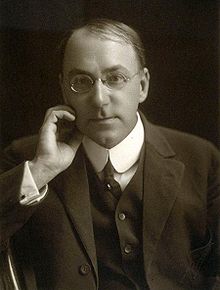Gelett Burgess
| Gelett Burgess | |
|---|---|

Circa 1910
|
|
| Born | Frank Gelett Burgess January 30, 1866 Boston, United States |
| Died | September 18, 1951 (aged 85) Carmel, CA |
| Occupation | Novelist, Engineer |
| Nationality | American |
| Literary movement | West Coast Response to the European Decadent movement |
| Notable works |
The Purple Cow, The Wild Men of Paris |
Frank Gelett Burgess (January 30, 1866 – September 18, 1951) was an artist, art critic, poet, author and humorist. An important figure in the San Francisco Bay Area literary renaissance of the 1890s, particularly through his iconoclastic little magazine, The Lark, he is best known as a writer of nonsense verse, such as "The Purple Cow", and for introducing French modern art to the United States in an essay titled The Wild Men of Paris. He was the author of the popular Goops books, and he coined the term blurb.
Born in Boston, Burgess was "raised among staid, conservative New England gentry". He attended the Massachusetts Institute of Technology, graduating with a B.S. in 1887. After graduation, Burgess fled conservative Boston for the livelier bohemia of San Francisco, where he took a job working as a draftsman for the Southern Pacific Railroad. In 1891, he was hired by the University of California at Berkeley as an instructor of topographical drawing.
In 1894, Burgess lost his job at Berkeley as a result of his involvement in an attack on one of San Francisco's three Cogswell fountains, free water fountains named after the pro-temperance advocate Henry Cogswell who had donated them to the city in 1883. As the San Francisco Call noted a year before the incident, Cogswell's message, combined with his enormous image, irritated many:
In response, numerous acts of minor vandalism had been inflicted upon the fountain.
The toppling incident took place in the early hours of January 1, 1894. As the Call reported,
The newspaper noted that "no one professes to have knowledge of the perpetrators of the outrage," and no arrests had been, or were, made. However, Burgess's involvement was suspected and is generally viewed as the reason for his resignation from the university, reported by the Call on March 10, 1894, with the note that the resignation was "to take effect with the close of the year."
...
Wikipedia
